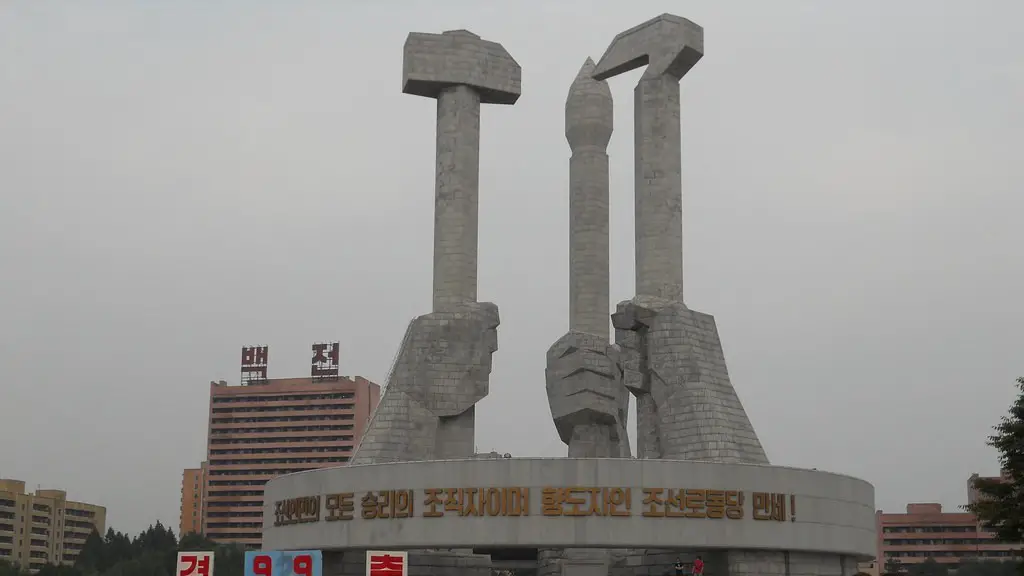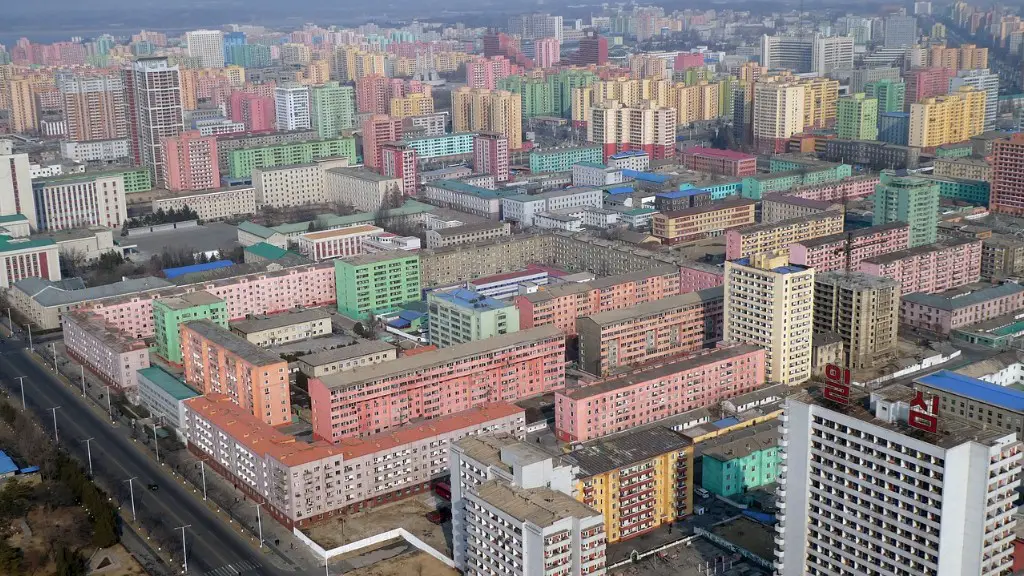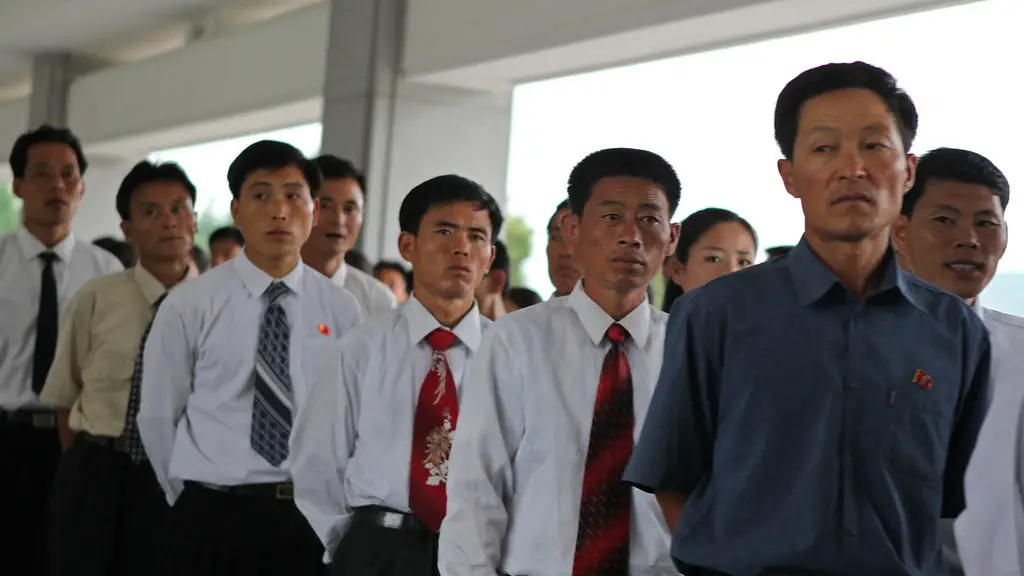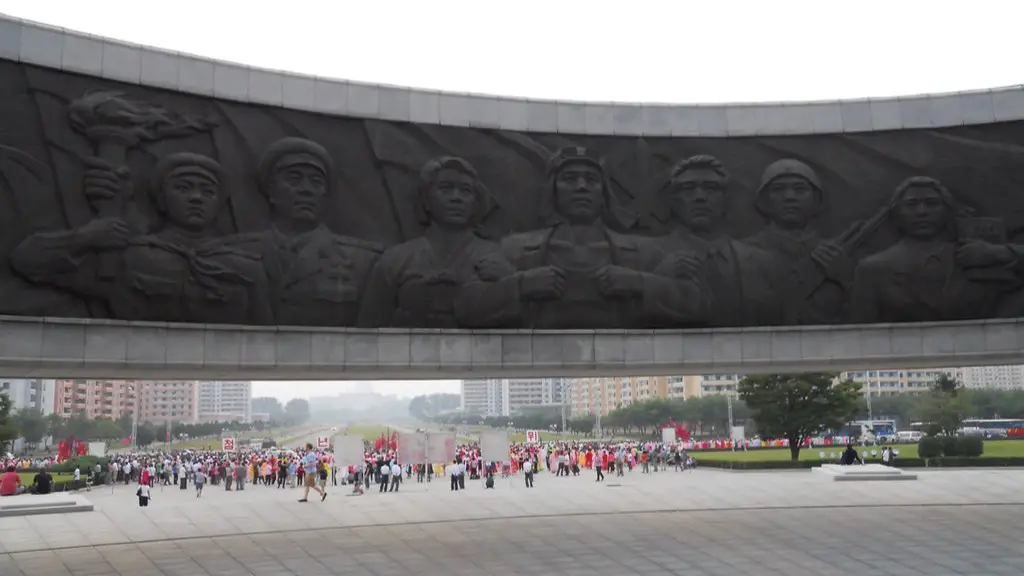What Sanctions Do We Have On North Korea
Sanctions imposed on North Korea are discussed regularly in the international community, and there is no denying that North Korea has been bearing the brunt of these for several decades. To this day, the country remains isolated and under the United Nations’ arms embargo and export ban, as well as a range of stringent economic sanctions.
According to the United Nations, sanctions against North Korea began in 2006, when the Security Council unanimously passed a resolution demanding an end to the country’s nuclear weapons activities. Since then, the resolution has been strengthened through various additional resolutions, all of which have been aimed at curbing North Korea’s development of nuclear weapons. This has included the International Atomic Energy Agency, who has placed stringent nuclear safety and security restrictions on North Korea.
In addition to this, the UN Security Council has imposed a number of financial sanctions, as well as restrictions on North Korea’s access to markets and foreign exchange. These have included bans on the import of luxury goods and the export of products which can contribute to the proliferation of weapons of mass destruction.
The United States’ sanctions against North Korea have been particularly effective. These have included a travel ban, which prevents any person from travelling to or from North Korea, as well as a ban on certain imports into the US. These restrictions have been effective in limiting North Korea’s access to foreign markets and resources, making it more difficult for the country to acquire materials for nuclear weapons and missile development.
Experts in the international community have been divided over the effectiveness of sanctions against North Korea. While some argue that sanctions have been partially effective in curbing North Korea’s nuclear weapons capabilities, many experts point out that the country’s nuclear weapons program has been relatively successful.
Furthermore, some experts point out that the enforcement of sanctions has been less than successful. They argue that North Korea has been able to circumvent some of the restrictions by engaging in international smuggling and other underground activities. In recent years, the country has also been able to increase its exports to some countries, despite the sanctions in place.
It is evident that the sanctions against North Korea have had a significant impact on the country, particularly when it comes to limiting the country’s access to resources and foreign markets. Despite this, it is clear that the effectiveness of these sanctions has been limited, and there is still much more to be done to limit North Korea’s nuclear weapons program.
Repercussions of Sanctions On North Korea
As a result of sanctions on North Korea, the country has experienced a severe economic downturn and its citizens have had to struggle to survive. Many North Koreans suffer from a lack of basic necessities due to the restrictions on the sale of goods, both domestically and abroad. In addition, these sanctions have impeded the development of North Korea’s economy, with the country unable to access global markets and resources.
Furthermore, these sanctions have restricted North Korea’s access to foreign aid, with the country facing severe shortages of medicine and other humanitarian assistance. This has had a disastrous effect on the health of many North Koreans, with the country’s infant mortality rate estimated to be nearly twice the global average.
It is also arguable that sanctions have had a negative effect on North Korea’s diplomatic relations. International organizations and countries are less likely to engage in trade with North Korea due to the restrictions in place, leading to further isolation for North Korea. This has also contributed to North Korea’s strained relations with South Korea, making it difficult for the two Koreas to work together towards a peaceful resolution.
In addition, some experts believe that the sanctions against North Korea have had a negative effect on the country’s citizens. For example, it is argued that the restrictions have deprived many North Koreans of the right to basic freedoms such as freedom of information and expression. This may be a cause for concern, as a lack of access to information has been linked to a decrease in human rights and democracy in the country.
All in all, there is no denying that the sanctions against North Korea have had a significant effect on the country. They have restricted the country’s access to resources, international markets and foreign aid, leading to severe economic and humanitarian crises. Furthermore, experts have argued that these sanctions have had a negative impact on North Korea’s diplomatic relations, as well as on the rights and freedoms of its citizens.
Other Countries Imposing Sanctions on North Korea
In addition to the United Nations and the United States, a number of other countries and international organizations have imposed sanctions on North Korea. In recent years, China has also imposed financial sanctions against North Korea, in an effort to curtail the development of North Korea’s nuclear weapons program. Additionally, the European Union and Japan have both imposed economic sanctions, as well as travel restrictions, on North Korea.
Furthermore, the Australian government has imposed a range of financial sanctions on North Korea, as well as a ban on imports and exports of certain goods. This has included a ban on the export of businesses or goods to North Korea. These sanctions have been aimed at preventing the sale of arms, luxury goods and other goods which could be used to support the North Korean government’s weapons program.
Interestingly, South Korea has also imposed a number of sanctions on North Korea. While these are less severe than the international sanctions imposed by the United Nations and the United States, they are still significant. For instance, South Korea has imposed restrictions on the export of goods, as well as restrictions on the travel of South Koreans to North Korea. Additionally, South Korea has banned North Korean ships from entering its ports and has frozen assets of North Korean citizens in South Korea.
These sanctions imposed by other countries and international organizations have all been aimed at pressuring North Korea, in an effort to force the country to abandon its nuclear weapons program. While many of these sanctions have yet to yield significant results, it is clear that they have had a significant economic and humanitarian impact on North Korea.
Effectiveness of the Sanctions On North Korea
The effectiveness of the sanctions against North Korea is a matter of debate. While some argue that the sanctions have been somewhat effective in curtailing North Korea’s nuclear weapons activities, many experts point out that the country has still been able to make significant strides in its weapons program.
In addition, it is argued that the enforcement of sanctions against North Korea has been weaker than expected. Many countries are not fully complying with the sanctions, allowing North Korea to continue to access resources and foreign markets. This is in part due to the country’s close relationship with China, which has refused to fully enforce the sanctions.
However, it is worth noting that the sanctions have had a significant impact on North Korea’s economy. The country has experienced severe economic strife due to the restrictions on its access to international markets, leading to severe shortages of food and medicine. This has had a disastrous effect on the well-being of North Koreans, particularly those in vulnerable positions such as those in rural areas.
In conclusion, while the effectiveness of the sanctions against North Korea is often disputed, it is clear that these have had a significant effect on the country. It is possible that these sanctions will eventually lead to greater pressure on North Korea, forcing the country to abandon its nuclear weapons program. Until then, it is imperative that the international community continues to enforce the sanctions in order to limit North Korea’s access to resources and foreign markets.
Sanctions On North Korea in the Long Run
It is uncertain how effective the sanctions against North Korea will be in the long run. However, it is likely that these will continue to put pressure on the country in an effort to force it to abandon its nuclear weapons program. In addition, the sanctions may be effective in curbing other North Korean activities, such as its human rights abuses.
Nevertheless, the effectiveness of the sanctions will depend on the level of enforcement. It is essential that all countries comply with these sanctions if they are to be effective in limiting North Korea’s access to resources and foreign markets. It is also possible that other forms of pressure, such as diplomatic negotiations, may be necessary in order to further limit North Korea’s access to nuclear weapons.
Furthermore, it is important that the international community takes into account the impact of the sanctions on North Korean citizens. It is clear that these sanctions have had a devastating effect on the country’s economy and the well-being of its citizens, and it is essential that the international community takes steps to ensure that the country’s citizens are not further disadvantaged by the sanctions.
Finally, it is important to consider the long term consequences of the sanctions. It is possible that the sanctions will eventually lead to further isolation of North Korea, as well as further economic hardship for its citizens. It is therefore essential that any sanctions imposed on North Korea are designed in such a way that ensures the safety and welfare of the North Korean people.
Recommendations For Sanctions on North Korea
Given the impact of the sanctions imposed on North Korea, there is a need for better strategies to be put in place. Firstly, the international community needs to ensure that the sanctions are enforced fully, and that all countries are compliant. This will ensure that North Korea is not able to access resources or foreign markets in an effort to build its nuclear weapons program.
Furthermore, it is important that the UN Security Council takes into consideration the impact of the sanctions on North Korean citizens. It is essential that any sanctions imposed are done in such a way that minimizes the risk of further economic hardship and deprivation of basic rights for North Koreans. This could be achieved by focusing more on targeted sanctions and avoiding blanket sanctions, which can have a far greater impact on civilians.
It is also essential that the international community works towards a diplomatic solution with North Korea. By engaging in diplomatic negotiations, it is possible to persuade the country to abandon its nuclear weapons program without resorting to economic sanctions. This would benefit both North Korean citizens, as well as the international community.
Finally, there is a need for increased investment in North Korean economic development, particularly in areas such as agriculture and industry. This would help to create jobs and incomes for North Koreans, providing an alternative to the country’s reliance on nuclear weapons. This would also provide a boost to the country’s economy, helping to alleviate poverty and improve the wellbeing of North Koreans.





